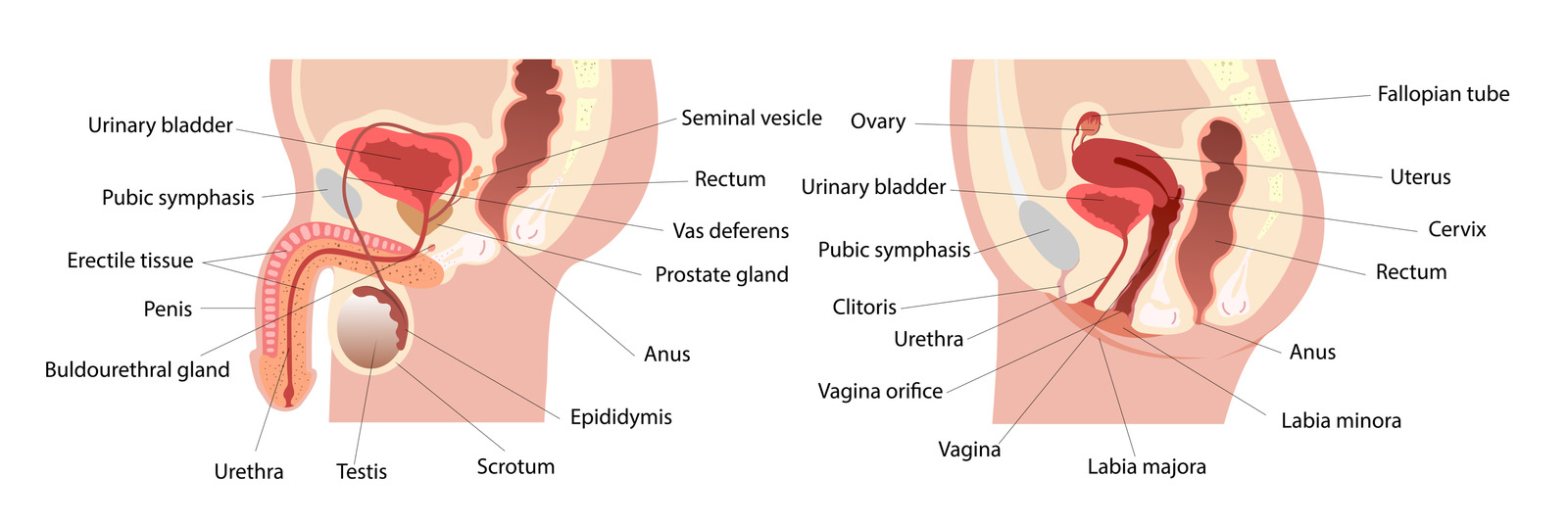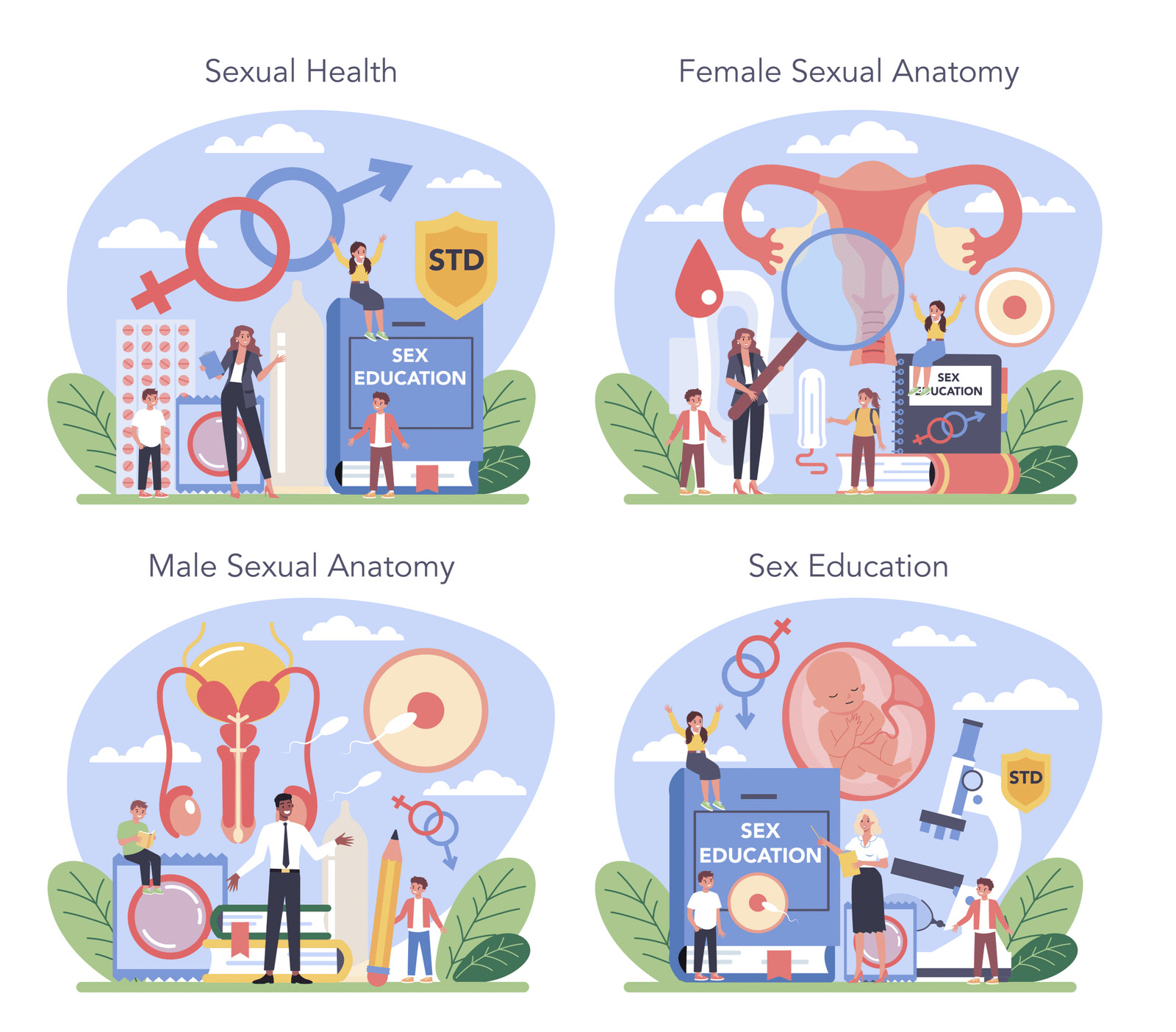Many of us were not given proper sex education, if at all.
That can make talking to your kids about sex can seem super awkward, but it doesn’t need to be.
Infancy might seem too young, but according to a study by Montclair State University professors Eva Goldfarb and Lisa Lieberman, “comprehensive sex education can prevent child sex abuse and intimate partner violence, increase appreciation for sexual diversity and improve environments for LGBTQ students, among other benefits.”
Comprehensive sex education is taught in countries like Sweden, France, the Netherlands, Denmark, and Belgium. These countries also have low teen pregnancy rates.
UNESCO has created guidelines to help teach sex ed to different age groups. They support comprehensive sex ed to improve health, human rights, and gender equality.

Age Appropriate Sex Ed Starts Early
Sex education needs to begin when a child is still young so that they have a solid foundation that builds over time with age-appropriate discussions about sex. It’s a much more natural approach that normalizes sexuality instead of making it shameful and taboo.
So how should you start talking about sex with younger children? Start by teaching your child the proper names for their body parts: vulva, vagina, breasts, penis, scrotum, testicles, buttocks, and anus. If you cringe thinking about having to say those words out loud, especially to your child, it’s because you were taught that those words were shameful when they’re the proper terms that should be used.
Use Proper Terms
Avoid using euphemisms, as this will make your child think that their body parts are shameful or that the proper names for those parts are bad words. It could also be confusing if your child is trying to report sexual abuse. They might end up being ignored or misunderstood. Learning the proper terms for body parts is just as much for your child’s safety as it is to help them begin learning that sex is natural and a part of life.
 Younger kids can also begin learning about consent. Children have the right to say “no” if they don’t want to hug someone or shake someone’s hand. Don’t force your child to hug, kiss, or touch someone because you think it’s polite. Respect their boundaries and listen to them if they say “no.”
Younger kids can also begin learning about consent. Children have the right to say “no” if they don’t want to hug someone or shake someone’s hand. Don’t force your child to hug, kiss, or touch someone because you think it’s polite. Respect their boundaries and listen to them if they say “no.”
If your child knows their boundaries should be respected at all times, it will be easier for them to realize when someone is being inappropriate or predatory.
ALSO: Omegle is the Lesser Known Chat Site That Endangers Children
Younger kids can also learn about family. They should be able to name all the people in their family and know that all families are different. Some people have one dad, some have two dads, etc.
If you’re not sure how to approach these topics, reading books to your child is a great way to teach them sex education. Sex Ed Rescue has a list of book recommendations by age.
Early Sex Ed Protects Children From Predators
With children who are around 6-8 years old, you can start talking to your child about puberty, reproduction, exploring their bodies privately, proper hygiene, and menstruation.
Children in this age range also need to learn how to stay safe from predators. They need to learn how to be safe on the internet and avoid talking to strangers and going with strangers.
Since 93% of children who are abused know their abuser, your child needs to know that fact and learn the warning signs. They should learn what appropriate and inappropriate behavior is. Make it clear that they need to come to you no matter what and will not get in trouble if they experience anything that makes them feel uncomfortable or unsafe.
It’s a difficult topic, but it’s important in order to keep your child safe. Here are ten books for kids that talk about how to prevent sexual abuse. Reading books with your child will make it easier for them to understand and will also make it easier for you to talk about it with them.
When children are between the ages of 9-12, it’s a good time to start talking to them about sexism, sexualization, body positivity, and how media can distort reality. Continue to remind children of internet safety and privacy online.
Starting Early Makes Each Talk Easier
If you already started talking to your child about sex early, then talking to your teen about sex should not be this big dreaded thing. It should be a normal conversation, just like talking about curfews and online bullying.
ALSO: Should Parents Allow Teens to Drink at Home?
Teens need to know about safe sex and contraception. They also should know that they can be a virgin for as long as they want and not feel the need to give in to peer pressure. It needs to be their decision. There’s nothing wrong with waiting.
Teens should learn about different types of sexuality and that all expressions of love and sexuality are valid. Make it clear to them that no matter what they identify as you will love them and support them no matter what. They also don’t need to label themselves right away; they can explore and take their time to figure things out.
Consent, sexual harassment, internet safety, how porn is not real sex, knowing the warning signs of a toxic relationship, and intimate partner violence are all important topics to discuss with your teenager. Teens are learning how to have relationships and only know what relationships are based on the relationships they see within their family and friend group and what they see in the media.
ALSO: Parenting Style — Are You Authoritative, Permissive, or Authoritarian?
Many movies and TV shows glorify toxic relationships, so teens need to be aware of what is healthy and unhealthy. Intimate partner violence is very common in our society. The best way to prevent your teen from ending up in an abusive relationship is to talk to them about the warning signs of an abusive partner and remind them to break it off immediately as soon as they see any of those signs.

Teens are teens, so even if you have a good relationship with your child, they might not want to talk to you about condoms and sexual identities. I highly recommend giving your child a copy of S.E.X. by Heather Corinna. It is sex-positive and inclusive.
There are so many books and resources online to help you brush up on your human sexuality knowledge and also help you learn what topics to discuss for each stage of your child’s life.
Amaze has some great, age-appropriate sex ed videos for pre-teens and teens. Amaze also has some helpful resources for parents, including a sex ed section for kids.
Your child will benefit greatly from having comprehensive sex education. It will keep them safe and teach them how to love and accept themselves and others.









Add comment